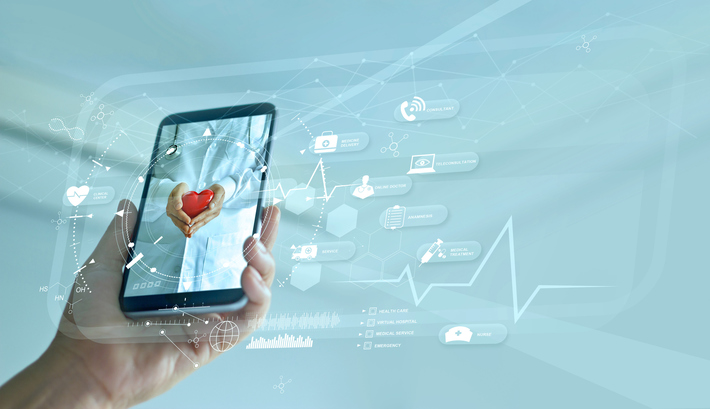 Since the outbreak of COVID-19 global pandemic, it is very much obvious that the world is constantly revolving around digital information and advancements in digital technology. The healthcare industry is no exception and has benefitted since the introduction of such digital healthcare solutions like EHR, patient engagement software, etc.
Since the outbreak of COVID-19 global pandemic, it is very much obvious that the world is constantly revolving around digital information and advancements in digital technology. The healthcare industry is no exception and has benefitted since the introduction of such digital healthcare solutions like EHR, patient engagement software, etc.
Since the introduction of electronic health records, healthcare institutions are witnessing changes in the delivery of patient care and treatment but the advantages of EHR do not just stop there. Healthcare institutions are primarily adopting EHR solutions to ease out the process of accessing patient data and sharing it across multiple sources and platforms. It is significantly impacting the way healthcare services are being delivered to the patients. The admin staff along with the healthcare professionals have come to an agreement that these EHR systems are making the process of collecting, storing, and fetching important patients records hassle-free.
EHR systems also enhance the patient experience, making it more efficient and effective. Patients are benefitting from these tech solutions. It is helping in reducing the patient wait time as well as smoothen the communication between patients and healthcare professionals. All these benefits are in turn improving the financial health of the healthcare institution. In a nutshell, EHR systems are helping multiple stakeholders.
How does the EHR system affect patient experience?
- Easy retrieval of patient data: Every patient brings along a series of healthcare data, especially someone with a complex medical history. Delivering the required medical attention for patients would be slightly difficult without using an EHR system. When healthcare professionals have the access to medical history in the form of digital records, well-informed and important decisions could be taken without any delay.
- Patient compliance & engagement: EHR systems help patients get more engaged with their healthcare process. Patients can keep a track of their medical records. They can view & manage their records, appointments, prescriptions all in one place. This helps in establishing patients trust in the healthcare system & processes, thus improves the doctor-patient engagement. Patients would show more participation when they are convinced that the processes are transparent and they have access to all important information.
- Convenience: Convenience is important for patients especially post the covid-19 crisis. Patients have started dreading scheduling appointments and long queues due to poor scheduling. With the help of EHR solutions, admin staff and patients, both have the required information for proper scheduling and reducing the long queues. With the integration of appointment scheduling and EHR, healthcare institutions can reduce the amount of time spent waiting.
- Stronger relationships: Healthcare experts also believe that EHR systems help in strengthening the patient/provider relationship in the healthcare industry. Efficient recording keeping and maintaining help in eliminating miscommunication and treatment mistakes. EHR solutions help bring both parties (patients & healthcare professionals) on the same page, resulting in better outcomes. The whole process helps in establishing trust between both parties, leading to an enhanced patient experience.
- Improved patient experience: Patient experience is becoming more effective with the implementation of EHR systems as it improves the overall operational efficiency of the healthcare institution. It provides the healthcare professionals with numbers & analysis which helps in identifying patterns, making a more accurate diagnosis, and suggesting treatments. Moreover, it helps in improving patient-doctor communication by giving them access to instant communication options.
- Streamlines work processes: EHR systems help in streaming the processes ranging from appointments, prescriptions, diagnosis, post-treatment care, etc. With all the information available in one place, it is easier for patients as well as healthcare professionals to smoothen out the workflow.
- Accurate patient data: When compared to manual/paper medical records, digital patient records are more consistent, accurate, and can be accessed by anyone remotely. Moreover, digitally storing healthcare records helps in keeping the information safe and secure. With the correct implementation of the EHR system and with the help of custom healthcare service providers following the guidelines, the process of digitally storing the information reduces the risk of data theft, duplication, or damage. Healthcare professionals can upload the data on a real-time basis.
- Cost reduction: EHR systems are equipped with payment and billing features that help the patients to manage their financials and claims in a better way. The tool helps with quicker insurance claims and reimbursements, benefitting both the healthcare institutions and patients.
Electronic health records (EHRs) are changing the way patients’ medical records are being maintained and accessed in the healthcare industry. It is further leading to better data interpretation and analysis, resulting in improved patient care and an overall improved healthcare system. Healthcare institutions can decrease their cost of manual billing and other manual processes and utilize their resources in a much efficient manner. With the implementation of EHR systems along with other digital healthcare solutions, healthcare institutions along with their tech partners like custom healthcare software development companies can turn around their workflows and can provide improved healthcare experience to their patients.
